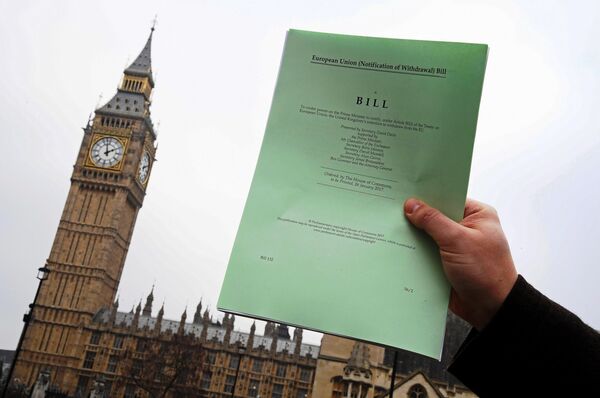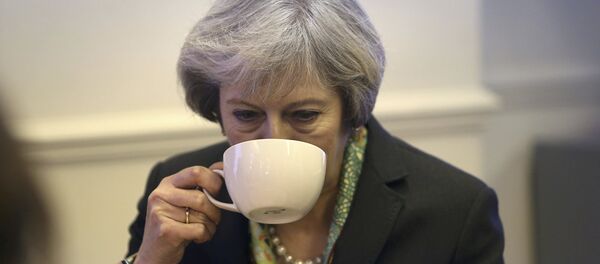Back in 1986, when "West End Girls" was number one in the pop charts, only the most diehard Euroskeptics could have dreamt that Britain would one day leave the EU. But it's happening now.
Last Wednesday (February 1) the House of Commons voted by 498 to 114 to invoke Article 50 — the EU exit clause. "Now we're on our way out of the EU" the front page of the Daily Express declared. The only question left now is: will we have a "hard" Brexit or a "soft" one?
MPs vote 498 to 114 to approve the Second Reading of the European Union (Notification of Withdrawal) Bill. pic.twitter.com/jgqy7rnw2i
— House of Commons (@HouseofCommons) February 1, 2017
A "hard" or "clean," Brexit would mark a complete break with the EU and its institutions, with the UK out of both the single market and the customs union. A "soft" Brexit would mean staying in the single market, in return for some increased control over the free movement of EU citizens.
Last week, the government finally published its plans in a White Paper. The Brexit Prime Minister Theresa May would like to see won't be as hard as the going used to be at Bath racecourse in August, but probably hard enough to please most of those who voted "out" last June 23.

The UK will withdraw from the single market but seek a new "mutually beneficial" customs arrangement and a free trade agreement with the EU. A new system to control EU migration will be created, although there could be "a phased process of implementation" to give business time to prepare. The government will work to secure the status of EU nationals already living in the UK, and British nationals living in other EU countries. Workers' rights will be protected. The government "will bring an end to the jurisdiction of the Court of Justice of the European Union in the UK."
The chances of a "soft" Brexit receded further this week when a key Remainer amendment to the Brexit Bill was rejected by a majority of 33. And although the government has promised MPs a vote on a final deal, before it goes before the European Parliament, it's difficult to imagine Parliament derailing Brexit in any significant way now. There will of course be attempts to make the forthcoming Parliamentary debates sound as if they're of life-shattering importance, but is the difference between a "hard" or "soft" Brexit really that much of a big deal (no pun intended)?
Given Britain's trade imbalance with its EU "partners" its hard to see leaving the Single Market as a tragedy. Seeing that they do so well out of trading with Britain, other countries in the EU would be mad not to want to strike new trade agreements as soon as possible. And if workers rights are fully protected, as the government has promised, why the "liberal" concern over a "hard" Brexit?
By obsessing over "hard" or "soft" Brexits, aren't we guilty of losing sight of the bigger picture — namely the UK's economy overdependence on financial services, its high level of personal indebtedness, and its chronic balance of payments problems? Regardless of how we leave the EU, Britain urgently needs to pursue a radically different economic course, if the country is to stay afloat, and this is really what we should be talking about now.
We need a break with banker-friendly neo-liberalism and a return to the policies governments pursued in the period 1945-79 and which benefited the majority of the population as opposed to just the financial elites. For all the spiel about helping manufacturing, that won't happen under Theresa May's Conservatives, who are in hock to the City. There's no reason economic reform can't happen under Labour, if the party gets its act together and ditches the neo-liberal Blairites. However, at a moment of great opportunity, the party of Keir Hardie, Clem Attlee and Harold Wilson, seems to be afflicted with a new bout of cautiousness — for example, only last week, Shadow Chancellor John McDonnell called for caps on price rises by profiteering energy companies, instead of advocating their wholescale re-nationalization.
Please RT if you agree that @UKLabour shld be supporting wholescale energy renationalisation & not just price caps. cc @johnmcdonnellMP
— CPO Public Ownership (@PublicOwnership) February 7, 2017
This timidity needs to be jettisoned. While Brexit has been portrayed as something terribly right-wing, and a phenomenon that no true progressive could possibly welcome, it could in fact lead to a renewal of democratic socialism in the UK, if Labour were brave enough to grasp the challenge.
I'm pretty sure that if those brilliant anti-globalist left-wing Labour politicians Tony Benn and Peter Shore were still with us today, they wouldn't be wasting their time debating the minutia of Brexit deals, and bemoaning Britain leaving a capitalist, TNC-friendly "single market," but be hard at work compiling a list of profiteering transport and utility companies to be taken into public ownership and urging Jeremy Corbyn to set up a new National Investment Bank and National Enterprise Board.
The "hard" or "soft" option debate is in so many ways a needless distraction away from the real problems facing the UK.
It's no wonder that the Establishment,and its stenographers, want us to focus obsessively on the "difficulties" and "complexities" of Brexit and not on rip-off rail and bus fares, public library closures, scandalously low old age pensions, and the rationing of important operations on the National Health Service.
These issues, at the end of the day, matter far more to ordinary people than a line from a thirty-year old Pet Shop Boys single which, to the convenience of the elite, has had a new lease of life in recent months.
The views expressed in this article are solely those of the author and do not necessarily reflect the official position of Sputnik.
Follow Neil Clark @NeilClark66
Support his Anti-Stalker Crowdfund



